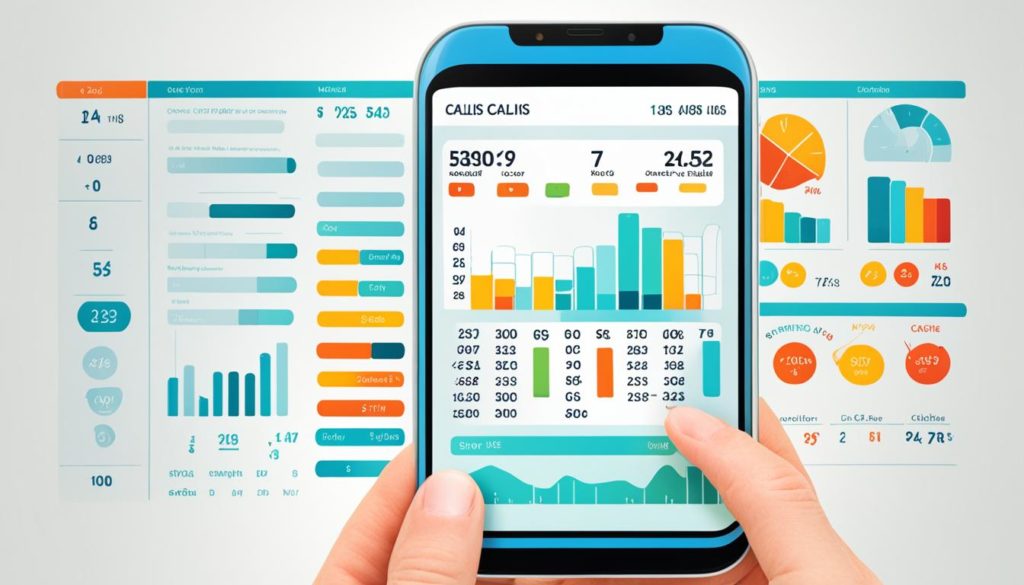Did you know that only 33% of Americans know how many calories they need each day? With more processed foods and less activity, knowing your calorie intake is key. Using a good calorie calculator helps you match your diet to your energy needs. This keeps you healthy and stops you from eating too much.
It’s important to know how many calories you need every day for a balanced life. Knowing your energy needs helps you choose better foods. This gives your body the right amount of fuel without overdoing it. This article will give you all the info you need about calorie counting and staying in energy balance.
Key Takeaways
- The majority of Americans are unclear about their daily calorie needs.
- A reliable calorie calculator can tailor your caloric intake to your individual requirements.
- Accurately calculating your daily energy requirements is crucial for optimal health.
- Understanding your caloric needs aids in maintaining energy balance and weight management.
- Knowledge of your daily calorie needs empowers you to make healthier dietary choices.
Understanding Daily Calorie Needs
Understanding your daily energy needs is key to a balanced and healthy life. The amount of energy you need changes based on many factors. It’s important to adjust your daily caloric intake to fit your needs.
“Knowing your daily caloric intake can significantly enhance your overall well-being by ensuring you provide your body with the correct amount of fuel.”
Three main factors affect how much energy you burn:
- Basal Metabolic Rate (BMR)
- Thermic Effect of Food (TEF)
- Energy used in Physical Activity
Basal Metabolic Rate (BMR) is the energy your body uses for basic functions while resting. This includes breathing, circulation, and cell production. BMR is the biggest part of your daily energy needs.

The Thermic Effect of Food (TEF) is the energy your body uses to digest, absorb, and process food. It makes up about 10% of your daily energy use and changes based on your diet.
Lastly, the energy used in physical activity covers all movements, from workouts to everyday tasks like walking or cleaning. This part of your energy use can change based on how active you are.
Knowing and figuring out your daily energy needs is a key step in managing your diet well. Understanding how these factors work together helps you create a diet plan that fits your needs. This ensures you stay healthy and feel good.
Importance of Calculating Caloric Intake
Knowing how many calories you need is key to good health. It helps if you want to keep your weight, lose weight, or boost your metabolism. A Caloric Intake Calculator is a must-have for your health.

Maintaining Energy Balance
It’s important to know how many calories you eat to keep your energy balanced. This means eating the same amount as you burn. It helps keep your weight steady and stops you from gaining or losing too much weight. A Calorie Calculator gives you the exact calories you need for your daily activities.
Supporting Weight Management
Keeping a healthy weight means tracking your calories well. With a Caloric Intake Calculator, you can set goals that fit your needs. This tool helps you make a diet plan that supports slow and steady weight loss. It’s key for managing your weight well.
Improving Overall Health
Watching and managing your calories does more than help with weight. It boosts your health by making your metabolism better, giving you more energy, and lowering the risk of diseases like diabetes and heart disease. Using a Calorie Calculator helps you make smart food choices. It makes sure you get the nutrients your body needs.
How to Calculate Daily Energy Requirements
Knowing how to figure out your daily energy needs is key to keeping healthy. It means figuring out how many calories your body needs to stay at your current weight. You must consider your resting metabolic rate and how active you are.
Using a BMR Calculator
A BMR calculator helps you find your Basal Metabolic Rate (BMR). This is the energy your body burns when you’re just sitting there. To use it, you enter your age, weight, height, and gender. It tells you how many calories your body needs every day for basic functions like breathing and circulation.
Factoring in Physical Activity
After finding your BMR, adjust it for your activity level to see your total daily energy use. Your activity level changes how many calories you burn, and it’s divided into different levels:
| Activity Level | Description | Multiplier |
|---|---|---|
| Sedentary | Little to no exercise | 1.2 |
| Lightly Active | Light exercise/sports 1-3 days a week | 1.375 |
| Moderately Active | Moderate exercise/sports 3-5 days a week | 1.55 |
| Very Active | Hard exercise/sports 6-7 days a week | 1.725 |
| Super Active | Very hard exercise/physical job | 1.9 |
To find out your total Calorie Needs per Day, multiply your BMR by the right activity multiplier. This gives you an idea of how many calories you need daily to keep your weight the same, based on your activity. Remember, using a BMR calculator and knowing your Calorie Needs per Day is key for managing your energy well.
Using a Caloric Intake Calculator for Precision
Knowing how many calories you need is key to reaching your health and fitness goals. A Caloric Intake Calculator is a powerful tool that gives you exact advice based on your unique needs. It’s vital whether you want to lose weight, build muscle, or keep your current health level.
A Caloric Intake Calculator needs details like your age, weight, height, and how active you are. With these details, it gives you a tailored estimate of your Daily Calorie Needs. Here’s what these calculators look at:
| Factor | Description |
|---|---|
| Age | Age affects metabolism. Generally, younger individuals require more calories. |
| Weight | Your body weight influences the number of calories burnt during daily activities. |
| Height | Taller individuals generally have a higher Daily Calorie Needs due to larger body mass. |
| Activity Level | Higher activity levels increase your caloric requirements as more energy is expended. |
With these details, a Caloric Intake Calculator creates a plan that fits your health goals. By knowing your Daily Calorie Needs, you can make smart food choices that support your lifestyle.
Factors Affecting Daily Caloric Intake
Understanding what affects your daily caloric intake is key to reaching your health and fitness goals. Age, gender, body type, and how active you are can all change how many calories you need.
Age and Gender
Age and gender play big roles in how many calories you need. Men usually need more calories because they have more muscle and burn calories faster. As we get older, our metabolism slows down, so we need fewer calories.
Body Composition
Your body’s make-up affects how many calories you burn. People with more muscle burn calories even when they’re not moving. So, a calorie calculator might suggest more calories for those with more muscle.
Activity Level
How active you are is also key. If you exercise a lot, you’ll need more calories to keep up your energy and recover. But if you don’t move much, you’ll need fewer calories.
| Factor | Impact on Caloric Needs |
|---|---|
| Age | Metabolism decreases with age, leading to lower caloric needs. |
| Gender | Men generally require more calories than women due to higher muscle mass. |
| Body Composition | Higher muscle mass increases caloric needs due to higher metabolic rate. |
| Activity Level | Increased physical activity raises caloric requirements to support energy expenditure. |
Calorie Needs per Day: Personalized Approach
Understanding your daily calorie needs is key to hitting your health goals. Whether you want to lose weight, gain muscle, or just maintain your current weight, a personalized plan is crucial. Using a caloric intake calculator helps you create a diet plan that fits your life and goals.
Your calorie needs depend on many things, so what’s right for one person might not be right for another. You need to think about your age, gender, weight, height, and how active you are. A caloric intake calculator looks at these factors to give you a precise idea of how many calories you should eat daily.
To start figuring out your daily calorie needs, here’s what to do:
- Find your Basal Metabolic Rate (BMR) using an online tool or formula.
- Think about how active you are and adjust the calorie advice you get.
- Decide on your goals (like losing weight, gaining muscle, or just keeping your current weight) and tweak your calorie intake to help you achieve them.
This way, you make sure you’re giving your body the right energy for good health and performance. Keep checking your needs with a caloric intake calculator and adjust as needed to keep up with your progress.
Tracking Your Daily Caloric Intake
Keeping an eye on your daily caloric intake is key to a balanced diet and reaching your health goals. Whether you want to lose weight, gain weight, or keep a healthy weight, tracking calories is crucial. You can use food journals or mobile apps and online tools to do this.
Food Journals
Writing down what you eat and drink is a classic way to track your daily caloric intake. It helps you understand your eating habits better and spot areas to improve. This method makes you more aware of your food choices and helps you make better ones.
- Documentation: Record meals, snacks, and drinks, and note their sizes.
- Analysis: Check your entries against your calorie goals to tweak your diet.
- Consistency: Keep up with daily entries for accurate tracking.
Mobile Apps and Online Tools
For a modern take, try mobile apps and online tools. They make tracking easier and give you insights into your daily caloric intake. Many apps let you scan barcodes, have a huge food database, and calculate calories automatically.
| Mobile App | Features |
|---|---|
| MyFitnessPal | Barcode scanning, big food database, works with fitness trackers |
| Lose It! | Set calorie goals, build recipes, get community support |
| Fitbit | Track activities, log meals, get personalized advice |
A calorie calculator in these apps can fine-tune your diet. It gives you the right calorie needs based on your age, gender, body type, and activity level. This way, you track calories well to hit your health goals.
Tips for Managing Calorie Consumption
Learning how to manage your daily calorie intake is key to a healthy life. Use strategies like portion control, choosing foods rich in nutrients, and staying active. This helps you meet your calorie needs and use a calorie calculator accurately.
Portion Control
Controlling your food portions prevents overeating and keeps you within your calorie limit. Try measuring your food, using smaller plates, and paying attention to serving sizes. This way, you eat enough without going over your calorie limit.
Choosing Nutrient-Dense Foods
Choosing foods packed with nutrients over those high in calories is vital. Foods like fruits, veggies, lean proteins, whole grains, and healthy fats give you what you need without too many calories. This supports your health and keeps you in line with your calorie needs.
Regular Physical Activity
Adding regular exercise to your life is also crucial. Activities like walking, jogging, cycling, or lifting weights burn more calories. This helps balance your calorie intake and usage. A calorie calculator can help adjust your diet based on how active you are.
Understanding the Role of Macros in Calorie Needs
It’s not just about counting calories. Carbohydrates, proteins, and fats, known as macronutrients, are key to meeting your calorie needs. They help your body work right.
“Macros are the building blocks of our diet, influencing energy levels, muscle growth, and overall well-being.”
Getting the right mix of these nutrients is vital. Carbs give you quick energy. Proteins help fix and grow muscles. Fats are vital for making hormones and keeping cells healthy. A Calorie Calculator can help adjust your diet for your goals, like losing weight, gaining muscle, or staying the same.
| Macronutrient | Role | Recommended Percentage |
|---|---|---|
| Carbohydrates | Primary energy source | 45-65% |
| Proteins | Muscle repair and growth | 10-35% |
| Fats | Hormone production and cell health | 20-35% |
Changing these percentages can change your health. Athletes might need more protein. Office workers might want more carbs. Getting your macros right helps your body work well and reach your goals.
Using a Calorie Calculator helps you make better diet choices. It leads to a healthier and lasting lifestyle.
Common Mistakes When Calculating Caloric Needs
Calculating your daily calorie needs can be tricky. Many people make mistakes that affect their health. Knowing these mistakes helps you get your calorie intake right for your body and lifestyle.
Ignoring Physical Activity Levels
Many forget how important physical activity is. Whether you work out daily or sit a lot, it matters. A caloric intake calculator adjusts for your activity level. Not using this can mean you might not get the right amount of calories.
Underestimating Food Intake
It’s easy to underestimate how much you eat. You might not measure food right or forget snacks and drinks. Tools like food journals or apps help track everything you eat. This ensures you know your calorie intake accurately.
Not Accounting for Individual Variability
Everyone’s calorie needs are different. Things like age, gender, metabolism, and health conditions affect your needs. A calculator is a good start, but adjust it for your body. Not doing this can lead to wrong calorie intake.
Avoiding these mistakes helps you find the right calorie amount for your health and fitness goals.
FAQ
What are daily calorie needs?
Daily calorie needs are the energy you need each day to keep your weight stable. This depends on your age, gender, body type, and how active you are.
Why is it important to know your daily caloric intake?
Knowing how many calories you need helps you keep your energy balanced. It helps you manage your weight and improve your health. It also prevents overeating and helps you reach your health goals.
How can I calculate my daily energy requirements?
Use a Basal Metabolic Rate (BMR) calculator to find out your base calories. Then, add calories based on your activity level. This gives you the total calories you need daily to stay at your current weight.
What is the role of a caloric intake calculator?
A caloric intake calculator gives you personalized calorie needs based on your age, weight, height, and activity level. This helps you create a diet plan that fits you.
How do age and gender affect daily caloric intake?
Age and gender change how many calories you need. Younger people and men usually need more calories because they have faster metabolisms and more muscle. As you get older, you need fewer calories.
What is a BMR calculator and how does it work?
A BMR calculator figures out the calories your body burns at rest. This includes calories for basic functions like breathing and cell production. It’s the base of your daily calorie needs.
Why should I track my daily caloric intake?
Tracking your calories is key for managing your diet. It keeps you on track with your nutrition goals, prevents overeating, and lets you adjust your diet for your health goals.
What are some common mistakes when calculating caloric needs?
Mistakes include not considering your activity level, underestimating how much you eat, and not accounting for your unique needs. These mistakes can lead to wrong calorie estimates, affecting your health and fitness goals.
How can I manage my calorie consumption effectively?
To manage calories well, control your portion sizes, choose foods that are full of nutrients, and stay active. These steps help keep your calorie intake and expenditure balanced, promoting better health.
What is the significance of macronutrients in daily calorie needs?
Macronutrients like carbs, proteins, and fats are key for your daily calories. Getting the right balance of macros affects your health, weight, and energy levels.
How do physical activity levels affect my daily caloric needs?
Your activity level changes how many calories you need. Active people need more calories to support their activities. Less active people need fewer calories. Including your activity level in your calorie calculation is important.
How can a personalized approach help in determining calorie needs per day?
A personalized approach looks at your health goals, lifestyle, and metabolism to find your daily calorie needs. This tailored plan makes sure you get the right calories for your goals.


